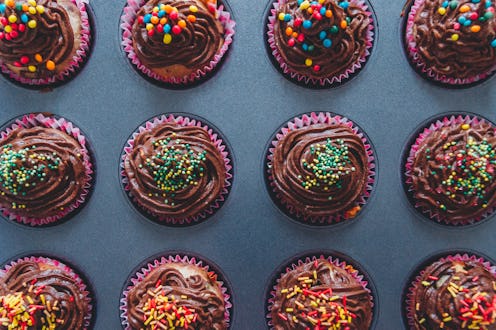Life
This One Weird Thing Makes Junk Food Unenjoyable

A new study reveals that eating junk food in front of a mirror makes it taste less delicious. Led by Ata Jami, a marketing professor at the University of Central Florida, the study suggests that our feelings about our actions, such as guilt or shame, have the power to change how we perceive taste. So if you’re planning on indulging in a less-than-healthy Christmas feast this week, you may want to take the mirror out of the dining room first.
To see how mirrors affect how people eat, Jami and his team conducted a series of experiments among 185 undergraduates from the University of Utah. In the first, the test subjects were given a choice between an “unhealthy” and a “tasty” chocolate bar (the bar was in fact the same in either case). Some subjects were placed in room a room with a mirror, and others without, and they were told to eat the chocolate and report on its taste. Participants from both rooms gave high marks to the so-called “healthy” bar, but they diverged in their opinions of the “tasty” one: People who had eaten it without a mirror liked it, but those who had watched themselves eat the bar in a mirror weren't impressed. So what gives?
As much as I would like to imagine that there's an evil magic mirror involved here, the issue in this case isn’t the mirror so much as self-awareness. According to a statement about a forthcoming article on this research, people use mirrors to see themselves from a distance, and in doing so, they “compare and match their behaviors with social standards of correctness.” Jami explains,
A glance in the mirror tells people more than just about their physical appearance. It enables them to view themselves objectively and helps them to judge themselves and their behaviors in a same way that they judge others.
So when people see themselves doing something that they perceive as a violation of these standards, like eating food they know to be unhealthy, they feel uncomfortable and unhappy — and they translate those negative emotions to their perception of the food’s taste.
Jami’s research shows that these changes in taste are linked particularly to whether the participants felt they had made good choices. The presence of a mirror, for example, didn’t affect how people felt about the “healthy” chocolate bar because they didn’t feel guilty about the choice they had made to eat it. In another experiment, participants were given a choice between brownies or dried fruit. Some of them were given their choice to eat, but others were given what they had not chosen, on the excuse that the researchers had run out of the other options.
When people who had chosen brownies sat in front of a mirror and ate their brownies, they reported not liking the food. But when people who hadn’t chosen brownies, but were given them anyway, ate brownies in front of a mirror, they liked the treats just fine. These results seem to suggest that the negative feelings people had while eating in front of the mirror stemmed from their sense that they had done something wrong by making an unhealthy choice. Without the guilt of having decided to eat brownies, the people who were simply given them didn’t feel that discomfort, and thus experienced no shift in their perception of the brownies’ taste.
Jami and his team theorize that mirrors could thus be used for behavioral modification in the future. By putting mirrors in restaurants, for example, we could encourage people to eat healthy food — simply because the unhealthy food will be less pleasurable when reflected back at them.
As Kate Horowitz at Mental Floss points out, there’s still research to be done before we start mirroring our dining rooms to promote healthy eating (or destroying every mirror we see, depending on how we feel about things). Jami’s study only considered how people felt about the food they were eating, not how much they actually ate. As most of us know from experience, feeling guilty about eating something unhealthy is often not enough to keep us from eating it — in fact, feelings of guilt or shame may only trigger more unhealthy food choices. And what exactly does “unhealthy” mean, anyway? In the case of the chocolate bar experiment, “unhealthy” and “tasty” referred to the same thing, and yet people perceived the bars in very different ways, suggesting that what matters here is not so much the actual health content of food, but our perception of what’s healthy — regardless of whether that perception is correct.